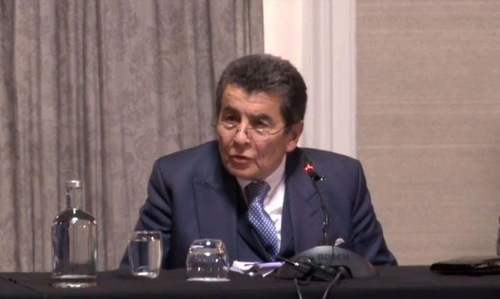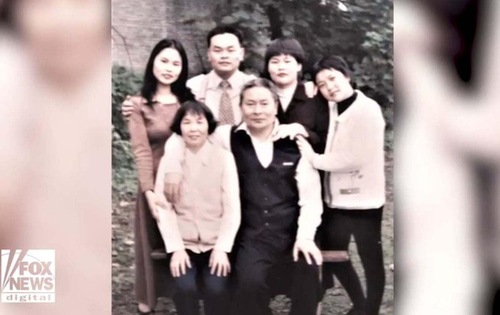Fox News Highlights State-Sanctioned Forced Organ Harvesting in China
(Minghui.org) On October 26, 2019, Fox News reported on the ongoing persecution of Falun Gong practitioners in China, including the Chinese regime’s killing of practitioners for organs. Reporter Hollie McKay interviewed practitioners and independent researchers and cited a report from the independent China Tribunal in London. The testimony and findings affirmed that organ harvesting from living Falun Gong practitioners still continues in China today.
The article, “Survivors and victims on shocking state-sanctioned organ harvesting in China,” began with the story of Jennifer Zeng, who was arrested for practicing Falun Gong in February 2000. At a labor camp in Daxing County, she was interrogated about her medical history and had her blood tested involuntarily. She told officials she had Hepatitis C prior to practicing Falun Gong.
Twelve days later, her cellmate died due to forced feeding. Mistreatment of Falun Gong practitioners in labor camps was common and ranged from physical abuse to forced organ harvesting. “Having hepatitis C might have [disqualified] me as an organ donor,” Zeng told Fox News.
Tribunal Report: Forced Organ Harvesting in China
 The report from the China Tribunal confirmed that forced organ harvesting from Falun Gong practitioners in China continues.
The report from the China Tribunal confirmed that forced organ harvesting from Falun Gong practitioners in China continues.
After spending a year independently assessing all available evidence, the China Tribunal Panel reported its findings in June 2019. Initiated by the International Coalition to End Transplant Abuse in China (ETAC), an international human rights charity, the tribunal is chaired by Sir Geoffrey Nice QC, who previously led the prosecution of Slobodan Milosevic in the International Criminal Tribunal for the former Yugoslavia.
The Tribunal report stated, “Forced organ harvesting has been committed for years, and Falun Gong practitioners have been one—and probably the main—source of organ supply.”
 Sir Geoffrey Nice QC, chair of the China Tribunal
Sir Geoffrey Nice QC, chair of the China Tribunal
The report highlighted the extraordinarily short waiting times for organs in China, as well as numerous websites that advertised hearts, lungs, and kidneys for sale. This evidence pointed to an industry in which donors are available on demand. The Tribunal concluded that Crimes Against Humanity have been committed with Falun Gong practitioners and Uighurs as victims.
Witness Testimony
Han Yu was arrested on July 20, 2015, and detained at Haidian District Detention Center in Beijing for 37 days. In May 2004, Han received a phone call saying that her father, a Falun Gong practitioner who had been held at a detention center for three months, had died. It was not until another month later that the family was allowed to see his body, at the Xiao Zhuang village morgue in Liangxiang District. Dozens of police officers monitored the family the entire time.
“I saw obvious injuries on his face, even after the makeup, the severe bruise below his left eye stood out. There was a trace of stitches starting from the throat down to where his clothes covered,” Han said. “I tried to unbutton the clothes. The police saw and quickly dragged me out. Later another family member went in and continued to unbutton, and [they] found stitches that went all the way to the stomach.”
She was afraid her father was a victim of organ harvesting. No autopsy was allowed, and the body was cremated immediately. “We were not even allowed to cry when he was buried,” Han said. Officials watched them the entire time and prohibited any photographs from being taken. “After I heard about organ harvesting, I couldn’t imagine what had happened to my father before his death. It happened, and it is [still] happening,” she said.
Another Victim: Family Only Allowed to See his Head
 Jiang Li described the tragic end of her father Jiang Xiqing.
Jiang Li described the tragic end of her father Jiang Xiqing.
Jiang Li said that her father Jiang Xiqing, another Falun Gong practitioner, was also a victim of forced organ harvesting. Jiang Xiqing was arrested on May 2008 and taken to a forced labor camp. Jiang Li and three other family members visited him on January 27, 2009 and said he appeared normal.
“Then at 3:40pm the next day, the labor camp called my brother and said he had died and immediately hung up,” Jiang Li said. “Seven of my family members arrived at the mortuary house at 10:30pm with the guidance of police officers. They read out the regulations—we could see the body for only five minutes, no cameras or communication devices, and we could only go to the freezer room to see Jiang’s head and not his whole body.”
As Jiang Li’s elder sister looked at his face, she screamed because his nasal area was still warm. His upper teeth were biting his lower lip—he was alive.
“We pulled out my father’s body halfway. We touched his chest, and it was warm. He was wearing a down jacket. My older sister prepared to perform CPR,” Jiang Li continued. “But were each forcibly dragged out of the freezer by four people. Uniformed and plainclothes officers pushed my father’s body into the freezer. They demanded that we quickly sign for cremation and pay the fees.”
 Jiang Xiqing, first from right in the front row, was named as another victim of forced organ harvesting.
Jiang Xiqing, first from right in the front row, was named as another victim of forced organ harvesting.
The family tried to seek justice, but their lawyers were detained and their home was ransacked by police. In addition, Jiang Li was terminated by her employer in 2010 without explanation and then detained.
 Falun Gong practitioners are subjected to frequent physical screenings and blood tests while held in China's prison system.
Falun Gong practitioners are subjected to frequent physical screenings and blood tests while held in China's prison system.
The Fox News report said Falun Gong practitioners were forced to undergo frequent physical screenings, including ultrasounds and X-rays, to monitor the quality of their organs. They were also severely tortured by officials to attempt to have them renounce their belief.
State-Sanctioned Crimes
After testifying before the China Tribunal, the China Organ Harvest Research Center (COHRC) published its own report in July 2019 based on years of research and analysis. The report stated that the “on-demand killing of prisoners of conscience is driven by the state, run on an industrial scale and carried out by both military and civilian institutions.”
In contrast to the large number of organ transplants every year, China does not have a voluntary organ donation system in place. Chinese officials have claimed that 10,000 transplants are carried out each year in China, but researchers estimate the number to be much higher, at 60,000-100,000 annually, based on their analyses.
Forced organ harvesting is driven by lucrative profits, COHRC explained in its report. “Data from 2007 shows that hospitals charged more than $65,000 for a kidney transplant, $130,000 for liver, and more than $150,000 for lung or heart. Desperate patients might make a high-price ‘donation’ for a new organ at top-speed,” Fox News reported.
This horrific form of malpractice probably started in the 90s on a small scale but escalated quickly around the year 2000, when Falun Gong practitioners became the key source of organs.
“China later claimed that death row prisoners consented to donate their organs to the State to redeem themselves for the crimes they had committed against the State, a practice China claimed to have stopped in January 2015. However, the explosion of organ transplant activities in China from 2000, together with reports of thousands of transplant tourists going to China to purchase organs, suggests a larger supply of organs than could be sourced from executed criminals alone,” the Fox News report stated. It cited the Tribunal's report, “The scale of the Chinese transplant industry, together with other evidence, points to the possibility that China is involved in forced organ harvesting and selling for profit organs from prisoners of conscience.”
The Tribunal confirmed that it “has had no evidence that the significant infrastructure associated with China’s transplantation industry has been dismantled and absent a satisfactory explanation as to the source of readily available organs concludes that forced organ harvesting continues till today.”
Grace Yin from COHRC said the Chinese government admitted less severe abuse by saying it was only happening to those awaiting capital punishment, to “divert attention away from the more severe issue.” “The root issue still goes back to the Communist Party’s persecution of faith groups and its animosity toward groups that it perceives as threats to its ideological control,” she continued.
Olivia Enos, a senior policy analyst of Asian studies at The Heritage Foundation, said organ harvesting has long been a largely overlooked aspect of human rights abuses and has been mainly reported by the Falun Gong.
Some U.S. officials have began to pay attention to this issue. “It is just so bizarre it was hard to believe. That [governments] can defile a human being like that,” Shawn Steel, California’s Republican National Committee (RNC) Member, said. “Medical tourism is big business; if you are wealthy, you can get the organ you need in a couple of weeks. Thousands are being sacrificed every year, and it is not being discussed.”
Earlier this year, Steel introduced a resolution to the RNC criticizing Beijing’s practice of forced organ harvesting from inmates. The resolution was unanimously adopted at the RNC conference in August.